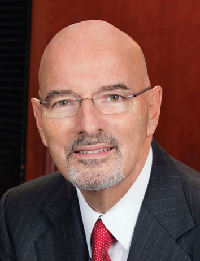More than 500 students have enrolled in at least one of Rutgers University’s real estate courses during the current academic year, up from 30 seats that were filled before the launch of the Center for Real Estate in 2014.
(Editor’s note: This story appeared in the February issue of Real Estate NJ.)
By Joshua Burd
For an industry in which the numbers truly do matter, the leaders of the Rutgers Center for Real Estate can point with pride to the program’s growth over the past five years.
Look no further than the more than 500 students who have enrolled in at least one of the university’s real estate courses during the current academic year — a sizable leap from the 30 seats that were filled before the center’s launch in 2014. That’s not to mention the growth in degree programs, scholarships and job placements, among other areas.

Morris Davis sees the opportunity to build on that growth and even accelerate it.
“Does the growth come from the latent interest in real estate? Absolutely. Kids are getting real estate jobs and they want training for it,” said Davis, the center’s academic director and the Paul V. Profeta chair of Real Estate at Rutgers Business School. “Does the demand come from our approach to teaching real estate? Yes, the students understand that they’re being taught by some of the top practitioners in the state.
“And then does the demand come from the way that we invest in students? And the answer is absolutely yes. The students know we’re unlike most places in Rutgers.”
With a foundation in place and support from many of the state’s top commercial real estate leaders, the Center for Real Estate is now looking ahead to the next five years and beyond. Davis, his team and the center’s committee of industry advisers feel that further growth will hinge on expanding and fine-tuning the course offerings — such as creating a standalone real estate major and a master’s in real estate — while navigating the challenges of fundraising and scaling up to support their growing student population.
Those efforts are well underway. Starting this academic year, the center has expanded its offerings with the launch of a new real estate track available to finance majors at Rutgers’ Newark campus, or what Davis calls a “quasi-major” in real estate. To complete the track, students must take four real estate courses — law, finance, development and investments — along with three of four electives: appraisal, capital markets, property and asset management and fixed income.
The curriculum is a step up from the current undergraduate concentration, which requires three real estate courses, having launched on the Newark and New Brunswick campuses in fall 2017 and fall 2018, respectively.
“It’s still a finance major,” said Davis, who joined Rutgers in 2014 after leading the James A. Graaskamp Center for Real Estate at the University of Wisconsin. “It’s just a much deeper dive into real estate and we hope to be able to port that to New Brunswick relatively soon.”
The new offering is another incremental step toward a much larger goal. Davis and his team are now in the early stages of developing a full, standalone major in real estate for undergraduates. But that is no easy task. Creating such a program requires approval from the state, which he said is a process that takes at least 18 months. That means that top administrators at the business school “want to make sure that you’re ready in terms of student demand.”
The same is true for the prospect of developing a standalone master’s degree in real estate, which the center also hopes to do, with specializations in development and industrial real estate and e-commerce. Davis believes that graduate-level enrollment in real estate classes and classes in other fields may have been hurt by recent changes to Rutgers’ MBA program, which reduced the number of courses required to graduate.
One solution, he said, is the standalone program.
“We know there’s demand for a master’s in real estate,” Davis said. He pointed, for instance, to the success of New York University’s Schack Institute of Real Estate, and while many New Jersey residents currently cross the Hudson River to attend the NYU program, he believes Rutgers could offer a comparable education with the added value of in-state tuition.
Additionally, the Center for Real Estate is exploring whether to offer a continuing education program for industry professionals. Davis listed that prospect as a top objective behind the standalone major for undergraduates.

As with other real estate programs, support from the industry has been vital to the center. That began in early 2013 when Paul V. Profeta, the owner and president of Paul V. Profeta and Associates Inc. and the publisher of Real Estate NJ, donated $1.5 million to establish a chair in the field. Those funds were matched by an anonymous donor to create $3 million in seed money for the real estate program.
By 2015, the center had assembled a group of industry influencers to form its Executive Committee, hosted its first conference and launched its first courses. Davis and the committee also recruited dozens of leading development executives and service professionals to form its Advisory Board, which continues to provide critical funding and guidance to the program.

“We are on a mission to become the best real estate center in the country,” said Profeta, who in 1980 helped launch the real estate department at Columbia University. Achieving that goal requires the funding to recruit top-tier faculty, which then translates into industry-leading classes and research, along with the ability offer graduates the best jobs.
The Rutgers program has achieved growth by almost every measure. After starting virtually from scratch five years ago, the center saw roughly 525 students enrolled in its courses for the 2018-2019 academic year, while courses such as law, finance and capital markets are full or nearly so on a consistent basis.
The center recorded another milestone in 2018, when it published a sweeping research paper on the impact of multifamily development on school-age children in municipalities, one that is now widely cited in land use proceedings in the state. Meantime, the department has compiled a calendar of both large conferences and small networking events for Advisory Board members and students.
Taking the next step will require additional investment and resources.
“There’s an enormous amount of room for growth, but with that growth we’re going to have to scale up the operation,” Davis said. “And anyone that’s run a business knows that one of the hardest things to do is to scale and to keep quality high. We’re expecting to scale, we’re expecting to grow and then our challenge is to make sure that we maintain providing a premium product.”
Davis and his team also have their sights set on increased scholarship funding. He expects the department to award some $300,000 to students this academic year, up from $26,000 four years ago, but its goal is to give out $1 million within five years.
“We’re comfortable with the $300,000 number,” Davis said. “The $1 million number is about where we expect our student body to be in five years’ time. We expect it to triple, so we want to make sure the scholarship money is there for them.”
Davis was quick to note that “many members of the community have stepped up” to support the growth to date, including some of the state’s prominent real estate families and industry associations. That support has been critical to ensuring that the university’s top real estate students can “make the decisions that maximize their career potential, rather than forcing them into a situation where they have to take a bad job to pay down student debt.”
But preserving and growing that support is tied to another top priority and an ongoing challenge: establishing an endowment for the Center for Real Estate. While the center in recent years has leaned heavily on its Advisory Board, Davis said it has sought a transformative naming gift that would allow it to “establish a permanence and a legacy of excellence for students at Rutgers.”
In the meantime, the Executive Committee remains focused on recruiting new board members to both grow the organization and replace seats that have turned over. For those who are not content to simply support real estate education, Profeta’s sales pitch emphasizes networking — namely, gaining access to some of the state’s most influential developers and service providers.
“What I say to them is, ‘You’re joining the New Jersey real estate society,’ ” Profeta said. “You’re becoming an official member and a member with standing.”
Davis also noted that Advisory Board members “get early access to the best students in New Jersey who are trained in real estate.” That exposure has allowed the center to provide its students with a growing list of job placements with the likes of Related Cos., The Hampshire Cos., Citigroup and PGIM Real Estate.
And, as Profeta noted, that relationship is meant to be mutually beneficial, especially for students that have left a job during their prime earning years to pursue an MBA.
“Getting a good, high-paying job coming out of that is absolutely critical,” Profeta said. “And they look for the school that’s going to afford them the best job. That’s one of their criteria, and if you’re able to offer students the best jobs and you have that reputation, you’re going to get the best students.”
(Editor’s note: Paul V. Profeta is the owner and publisher of Real Estate NJ.)










